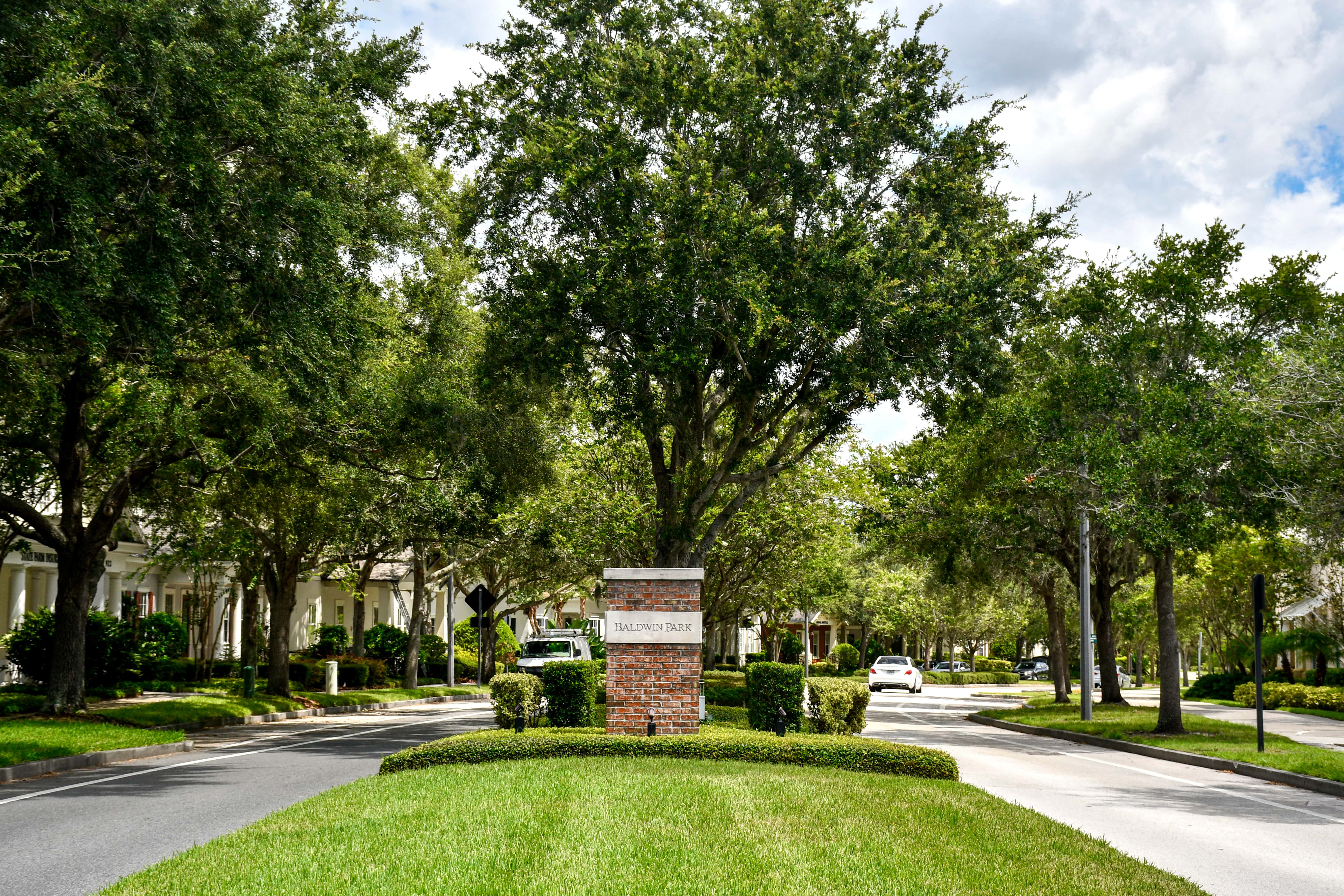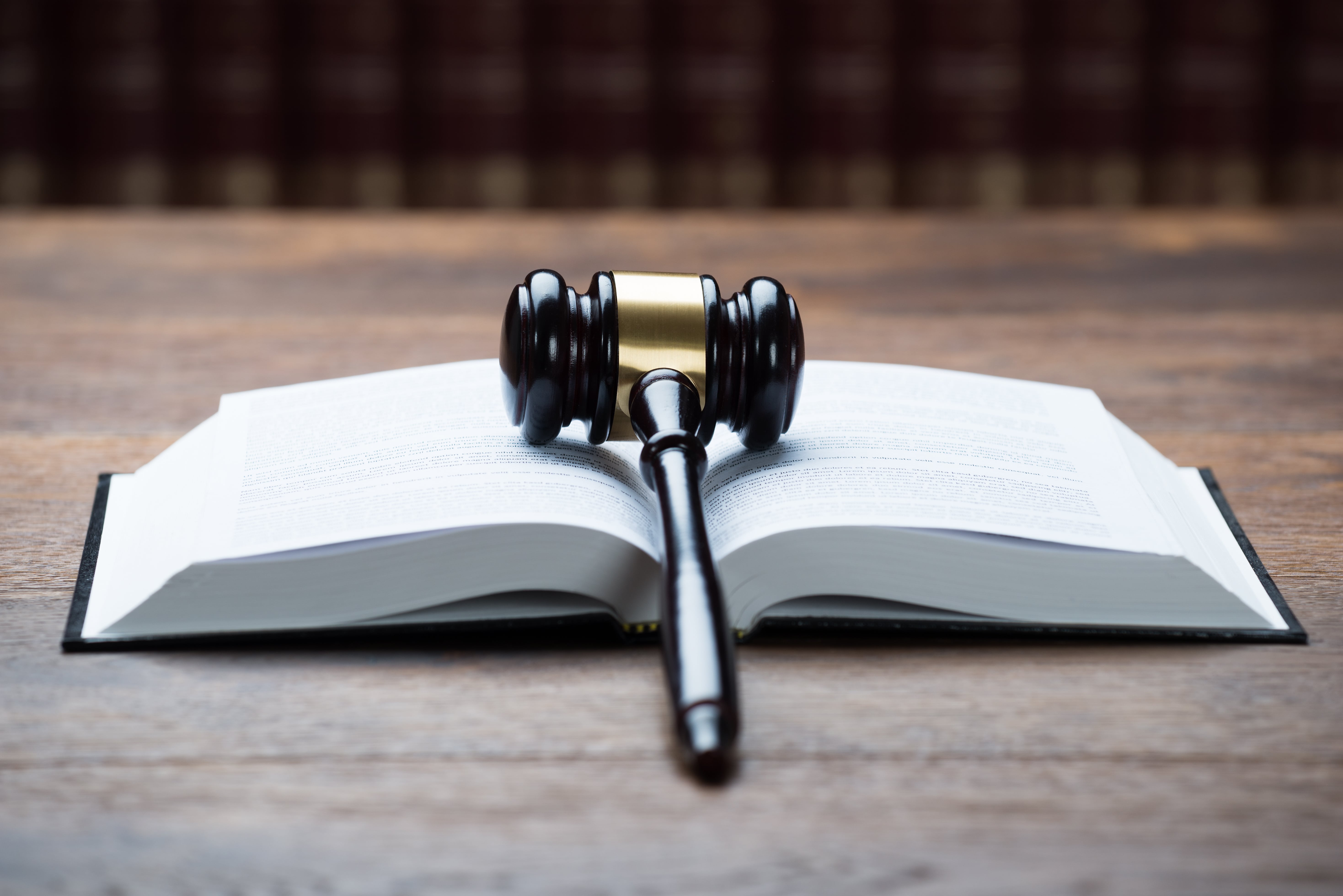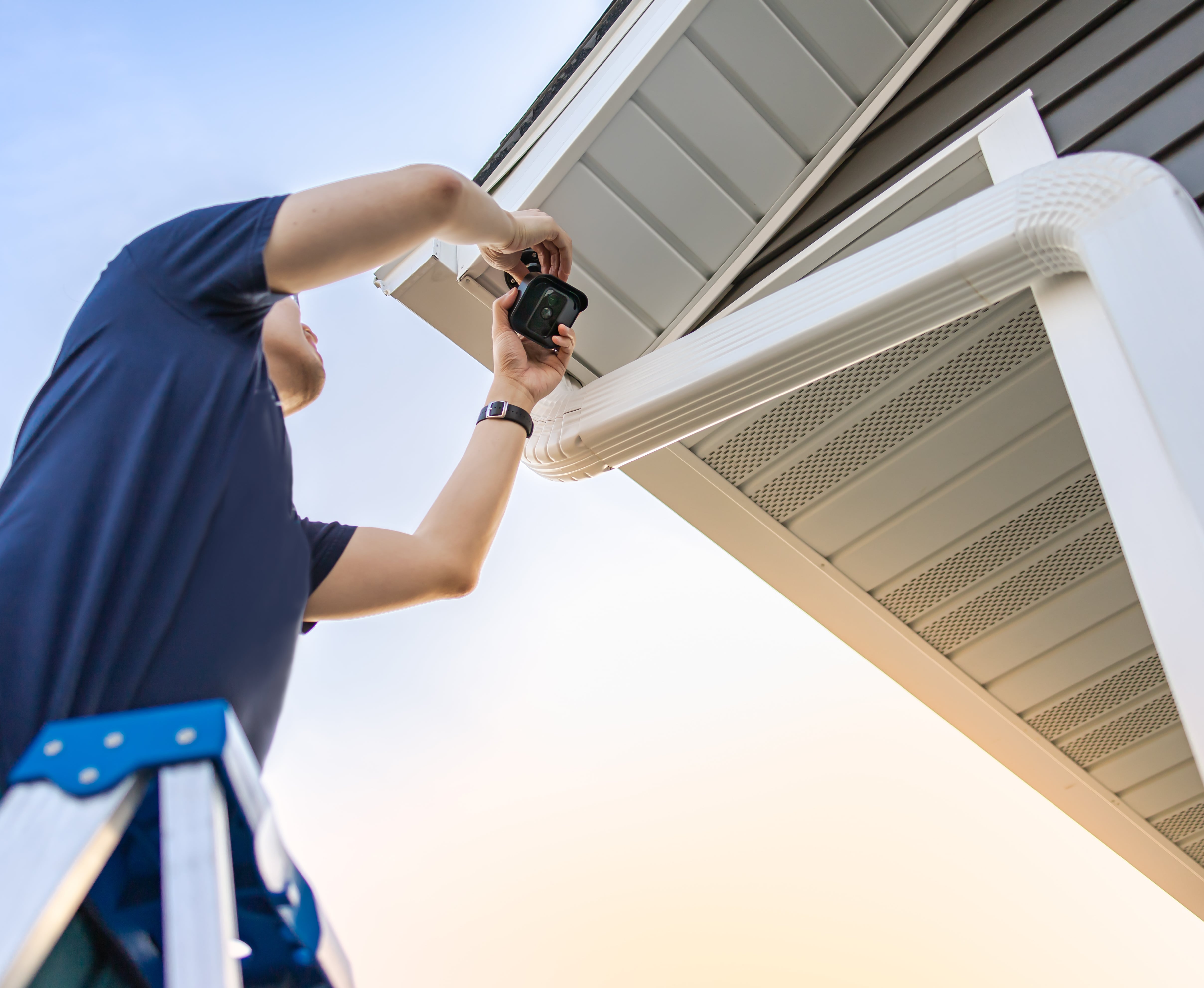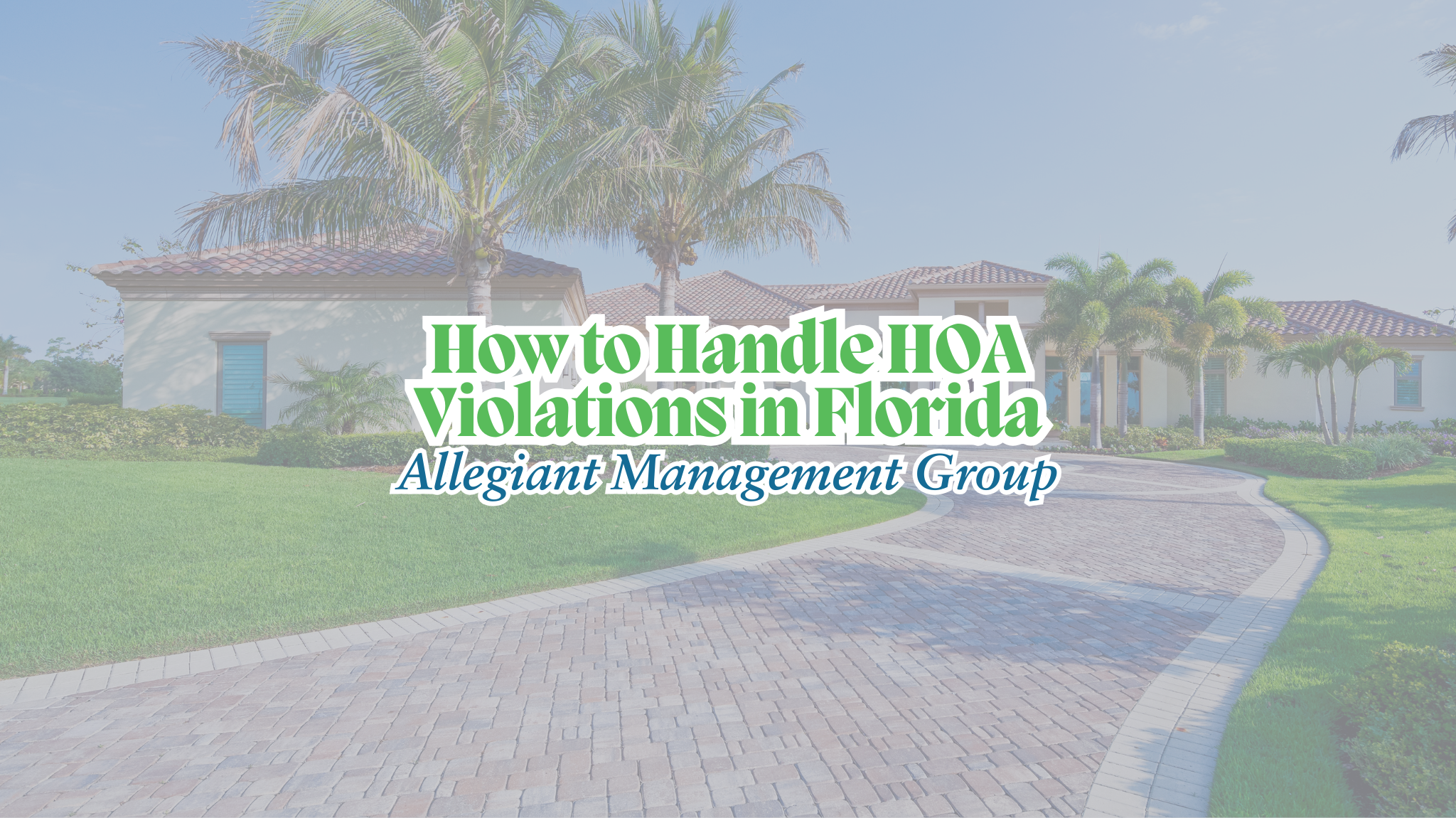Properly Handling HOA Violations in Florida
Understanding and handling HOA violations can be challenging, especially for homeowners unfamiliar with the process. We will review Florida HOA Laws, the violation process, and monetary penalties.
The Role of HOAs in Florida
HOAs and HOA managers enforce community rules to maintain property values and neighborhood standards. Homeowners must comply with these regulations to avoid potential violations.
What to Do If You Receive a Violation Notice
- Review the Notice or HOA Violation Letter – Understand the specific rule cited and any supporting evidence.
- Check the Deadline – Address the issue within the given timeframe to prevent additional penalties.
- Communicate with the HOA management or a board member – Ask for clarification or dispute the violation if needed.
- Provide Evidence – Document your case with photos or records if you believe the notice is incorrect.
- Explore Legal Options – If the violation remains unresolved, consider mediation or legal guidance.
By understanding HOA rules, homeowners and real estate professionals can handle violations better. This helps them manage disputes smoothly and stay compliant.
Understanding HOA's Role and Authority in Florida

Homeowners associations (HOAs) play a crucial role in maintaining property values and community standards. Their authority comes from governing documents (similar to articles of incorporation) and Florida state law. This ensures they follow legal limits while enforcing community rules and keeping of official records.
Key Aspects of HOA Authority:
- Rule Enforcement – HOAs establish and enforce community guidelines to maintain order and appeal.
- Governing Documents – The Declaration of Covenants, Conditions, and Restrictions (CC&Rs) outlines both homeowner and HOA responsibilities.
- State Regulations – Florida law regulates HOAs to protect homeowners’ rights and prevent overreach.
Why Homeowners Should Stay Informed:
- Avoid Violations – Knowing the rules reduces accidental infractions.
- Engage with the HOA – Open communication provides insights into board decisions and upcoming changes.
- Resolve Issues Efficiently – Understanding HOA authority helps homeowners navigate disputes effectively.
By staying informed and engaged, homeowners can foster a cooperative and well-managed community while protecting their rights. Consider joining the board of directors to be involved in the decision making first hand.
Make Yourself Familiar with Florida HOA Governing Documents

HOA governing documents establish community rules and homeowner responsibilities. Familiarizing yourself with them helps prevent misunderstandings and violations.
Key HOA Documents:
- Declaration of Covenants, Conditions, and Restrictions (CC&Rs) – Defines homeowner rights, HOA responsibilities, and property usage rules.
- Bylaws – Outline HOA operations, including meetings and decision-making processes.
- Rules & Regulations – Cover day-to-day guidelines on property maintenance and community standards.
Why These Matter:
- Helps homeowners anticipate expectations and avoid violations.
- Provides insight into how decisions are made and how to participate.
- Ensures compliance by staying informed on updates.
A thorough review of these documents empowers homeowners to make informed decisions and engage effectively with their HOA.
Identifying and Reporting Common HOA Violations

Understanding HOA violations helps homeowners and HOA members stay compliant and maintain community standards. Since HOA rules vary, regularly reviewing your community’s guidelines is essential.
Common HOA Violations:
- Improper landscaping or lawn neglect
- Unauthorized exterior modifications
- Parking violations (e.g., using guest spaces for residents)
- Unapproved pets or restricted animals
- Excessive noise disturbances
- Improper common areas use
How to Report an HOA Violation:
- Be Professional – Contact the HOA board or management respectfully.
- Provide Details – Include dates, times, and photos for clarity.
- Follow Procedures – Use the HOA’s official reporting method for efficiency.
If you receive a violation notice, addressing it promptly can prevent escalation. Staying proactive fosters a compliant and harmonious community.
The Notification Process for HOA Violations
When an HOA identifies a violation, the notification process begins. The board sends a written notice to the offending homeowner. This notice typically outlines the specific rule breached and details needed corrections.
Timeliness in this process is crucial. Homeowners usually receive a set period to rectify the issue. Failure to address the violation within this timeframe can lead to further penalties or escalation.
Documentation is key in the notification phase. Both homeowners and the HOA benefit from clear records, ensuring transparency. This documentation aids in resolving disputes and maintaining accountability on both sides.
Responding to an HOA Violation Notice

Receiving an HOA violation notice can feel overwhelming, but handling it methodically simplifies the process.
- Review the Notice – Understand the specific rule cited and any evidence provided by the HOA. Clarity here prevents future complications.
- Check the Deadline – Ensure you know the deadline for addressing the issue. Missing it could lead to further fines or enforcement actions.
- Communicate with the HOA – If you need clarification or believe he notice is unfair, reach out promptly. A respectful discussion may lead to a resolution.
- Gather Evidence – Take photos or videos to document your property’s condition. This can support your case if you need to dispute the violation.
- Seek Legal Advice if Needed – If the issue remains unresolved, consulting an attorney can help you understand your rights and options for appeal.
Addressing the violation promptly and strategically can help resolve the matter efficiently while protecting your rights as a homeowner.
Understanding Your Rights and the HOA's Limitations

As a property owner, knowing your rights helps you navigate HOA disputes effectively. Florida law, called the Florida Statutes, protects homeowners from unfair actions by HOAs.
It ensures that rules follow state and federal laws. Each HOA follows governing documents, like bylaws and covenants, that explain its authority.
You must apply rules consistently—if you notice selective enforcement, you have the right to challenge it. Additionally, HOAs cannot intrude on your property without valid cause, safeguarding your privacy.
The Consequences of Ignoring HOA Violations
Neglecting an HOA violation notice can lead to severe consequences. Over time, unresolved violations may result in fines adding. This financial burden can be substantial, affecting your budget.
Aside from fines, HOAs might place a lien on your property. This legal claim can impede your ability to sell or refinance. A significant risk exists for any homeowner.
Ignoring issues can also strain your relationship with the HOA. This can lead to more scrutiny and further complications. Addressing violations promptly is vital to maintaining harmony in your community.
How to Dispute an HOA Violation in Florida

Receiving an HOA violation notice can be frustrating, especially if you feel it is unwarranted. The first step in disputing a violation is to thoroughly review the governing documents of your HOA. These documents outline specific rules, your rights, and the process for contesting violations.
After becoming familiar with the rules, it's essential to gather evidence that supports your claim. This can include photographs, correspondence, or witness statements demonstrating compliance with HOA regulations. Clear documentation is crucial for building a solid case.
Next, contact the HOA board or property management company to discuss the violation. Approach the meeting professionally, presenting your case calmly and factually. Effective communication is key to resolving misunderstandings and reaching a fair outcome.
If an initial discussion does not resolve the issue, consider attending an HOA board meeting. Express your concerns and present your evidence at this formal setting. Sometimes a public forum can facilitate a resolution.
In cases where disputes remain unresolved, exploring mediation or legal counsel might be necessary. Mediation provides a fair space for both sides to find an agreement. Legal advice makes sure your rights are safe while you go through this process.
HOA Violation Fines and the Appeal Process
HOAs in Florida can impose fines for violations, but the rules vary by community. Check your HOA’s governing documents to understand potential fines and ensure they comply with state regulations.
If fined, you don’t have to pay immediately. Most HOAs offer an appeal process—contact the board promptly and follow their steps. Present evidence or extenuating circumstances to support your case. If the appeal fails, mediation or legal advice may help resolve the dispute.
Preventing Future HOA Violations: Tips for Property Owners
Staying informed is your first line of defense against violations. Regularly review your HOA's rules and updates. Attend meetings when possible to stay abreast of changes.
Maintaining open communication with your HOA can help prevent mis-understandings. If unsure about a rule or regulation, reach out and ask for clarity. This proactive approach can save you from unintended breaches.
Finally, conduct regular maintenance checks on your property. Ensure that it complies with HOA standards. Simple actions like keeping your yard tidy or properly storing trash cans can significantly reduce violation risks.
Staying Informed and Proactive with HOA Regulations
Navigating HOA regulations in Florida requires awareness and active engagement. Property owners must regularly review their HOA's rules and updates. This habit helps prevent misunderstandings and potential violations.
Proactivity in communication is equally important. Engaging in HOA meetings enhances understanding of current and future directives. Active participation provides insights into community decisions impacting your property.
Finally, maintaining a cooperative relationship with the HOA fosters a positive environment. Constructive dialogue facilitates conflict resolution and violation prevention. This approach not only protects your rights but also contributes to community harmony.
The Role of a Property Management Company in HOA Violations

A property manager helps homeowners navigate Florida HOA rules and violations by:
- Ensuring Compliance – Conducting inspections and addressing potential issues.
- Liaising with the HOA – Communicating violation notices and resolutions.
- Handling Violations – Advising homeowners on corrective actions.
- Managing Fines & Appeals – Assisting with dispute resolution and payments.
With expert guidance, property managers help maintain compliance and avoid costly penalties.
Need Professional Property Management in Florida?
Navigating HOA violations can be complex, but you don’t have to do it alone! Do you have a Florida rental property in an HOA community? Are you dealing with hefty HOA fines? Let us help turn this around.
At Allegiant Management Group, we offer expert help and complete property management. We assist homeowners in staying compliant and protecting their investments. Contact us today and let us see how we can help you!
Watch our Video on How to Handle HOA Violations in Florida.
Frequently Asked Questions (FAQs): Handling HOA Violations in Florida
What is an HOA violation?
An HOA violation occurs when a homeowner breaks the rules set by their homeowners association (HOA). Common violations include improper landscaping, exterior modifications, noise disturbances, and unpaid dues. HOAs enforce these rules to maintain community standards, often issuing warnings, fines, or legal action for noncompliance.
How to respond to an HOA violation notice?
Respond to an HOA violation notice by reviewing the complaint, checking HOA rules, and gathering evidence. If valid, correct the issue promptly. If disputing, submit a written appeal with supporting documents. Communicate professionally and meet deadlines to avoid fines or further action.
What are my rights as a homeowner in Florida regarding HOA violations?
Florida homeowners have rights under state law, including the ability to dispute HOA violations, request hearings, and review governing documents. HOAs must follow due process, provide notice, and allow appeals. Homeowners can challenge unfair fines or rule changes and seek legal action if the HOA acts unlawfully.
Can an HOA fine me for a violation?
Yes, an HOA can fine you for violations if allowed by its governing documents and state law. In Florida, fines require written notice and a hearing opportunity. Unpaid fines may lead to legal action or liens on your property. Review your HOA’s rules to understand specific penalties.
How can I dispute an HOA violation?
Dispute an HOA violation by reviewing the rules, gathering evidence, and submitting a written appeal. Request a hearing if required and present your case professionally. If unresolved, seek mediation or legal advice to challenge unfair penalties.
What happens if I ignore an HOA violation?
Ignoring an HOA violation can lead to fines, loss of community privileges, or legal action. In some cases, the HOA may place a lien on your property or initiate foreclosure proceedings. Respond promptly to avoid escalating penalties and potential legal consequences.
How can I prevent future HOA violations?
Prevent HOA violations by reviewing community rules, maintaining your property, and getting approval for changes. Stay informed about policy updates, address issues promptly, and communicate with the HOA when unsure about compliance. Regularly attending meetings can also help avoid unintentional infractions.
Disclaimer: The information in this article is for general information only. Do not consider it legal advice. HOA regulations vary by community, and Florida state laws may change over time. For specific guidance regarding your HOA violation, consult with a qualified attorney or your HOA board.
Blog Updated: 03/11/2025



